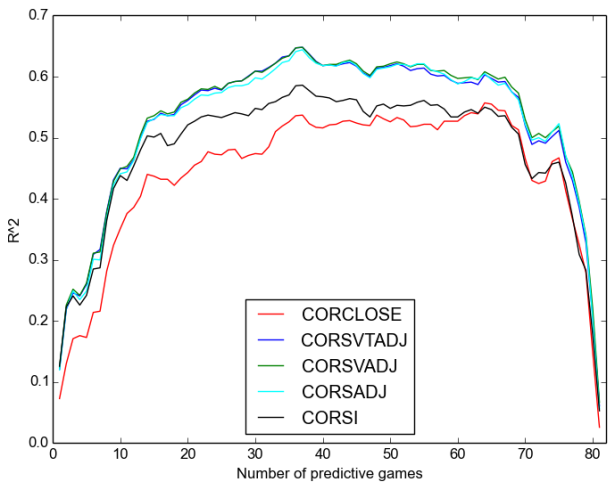lomiller1
Registered User
- Jan 13, 2015
- 6,409
- 2,968
That means nothing.
If puck possession is considered to be a good thing, it must correlate to winning hockey games.
Here's a chart plotting wins against CF% for the 2015 season with a miserable .22 r-value.
All that means is that winning an individual hockey game is a highly random thing. This should be no surprise as most games will hinge on plays where a puck bounces over someone’s stick or doesn’t, catches the corner of the goaltenders blocker or doesn’t, catches the post and stays out or doesn’t.
Over larger sample the small edge adds up and 5v5 score adjusted Corsi becomes much more predictive. In a sense it’s like a casino game where the house has a small advantage on individual games but this adds up over time. The r^2 value of CF% over 20 games in predicting the other 60 is ~0.55 and this climes to about 0.6 at 30 games. This is quite a large number given that two huge parts of the game (goaltending and special teams) are not even included.


 I personally use the "analytics community" in discussion pretty regularly, because I don't know how else to describe what I'm arguing, most of the time. I'm not a person who does any of the grunt work at all, but I read quite a bit by people who do, and when there's borderline consensus on something, how else is someone supposed to relay that info than by saying "group x makes this claim/tends to believe this"? Is it pretentious to use the term "scientific consensus" when discussing climate change? Because in effect you're making a similar statement. (noting the differences in the fact that sports stats are not science and climate change is a million times more important/well-studied than hockey)
I personally use the "analytics community" in discussion pretty regularly, because I don't know how else to describe what I'm arguing, most of the time. I'm not a person who does any of the grunt work at all, but I read quite a bit by people who do, and when there's borderline consensus on something, how else is someone supposed to relay that info than by saying "group x makes this claim/tends to believe this"? Is it pretentious to use the term "scientific consensus" when discussing climate change? Because in effect you're making a similar statement. (noting the differences in the fact that sports stats are not science and climate change is a million times more important/well-studied than hockey)